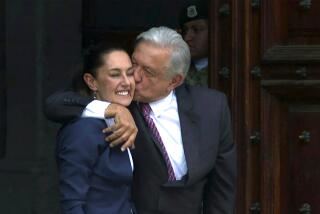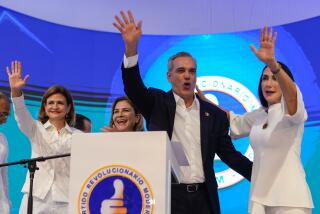Independent Falls Short in Colombia
GIRARDOT, Colombia â Former Foreign Minister Noemi Sanin on Sunday achieved the strongest showing recorded in modern times in this country by an independent presidential candidate, but she still lost to the two political parties that have governed for more than a century.
The Liberal and Conservative standard-bearers will battle for the presidency in a June 21 runoff election because no candidate received more than 50% of the vote.
With 96% of precincts reporting, Liberal Party candidate Horacio Serpa led with 34.5% of the vote, 12,700 votes ahead of the Conservative Partyâs Andres Pastrana with 34.4%. Reflecting an impressive showing in Bogota, the capital, Sanin received 27% of the vote, far ahead of the 10 other independent candidates.
More than 10 million voters cast ballots, a high turnout that occurred despite scattered incidents of election violence across the country that left six people dead. Guerrillas prevented voting in two rural counties. The violence was a reminder of the issue mentioned by nearly all voters interviewed: making peace with the guerrillas, who operate in at least 40% of the country.
Sanin rose so sharply in public opinion polls in recent weeks that pundits had speculated that she might be the independent who finally broke the traditional partiesâ hold on Colombian politics. However, striving to be both Colombiaâs first independent president and its first female president proved too difficult a goal.
The perception that Sanin, 48, could not win cost her support from Colombians determined to deny the presidency to Serpa.
Serpa, 55, was interior minister under the current, unpopular President Ernesto Samper. Some Colombians suspect Serpa of using his position to cover up evidence that Samper knew drug traffickers contributed $6 million to his 1994 presidential campaign, even though the prosecutor general cleared Serpa of those charges.
Serpa is seen as the heir of Samper, who is forbidden by the constitution from seeking reelection.
âWe want a dignified president with the moral authority to talk to the guerrillas,â said Diosil Bastides, a 35-year-old Bogota security guard who voted for Pastrana. âNot like what we had before.â Colombiaâs oldest and largest guerrilla group has refused to negotiate peace, claiming that Samperâs government is not legitimate.
*
Sanin triumphed in Bogota, capturing 41.5% of the vote with 94% of precincts reporting, but that showing could not make up for the traditional partiesâ strength in the countryside.
She is battling more than a century of deeply embedded party loyalties in towns like this resort on the banks of the Rio Magdalena, Colombiaâs most important river.
Known as âthe Cartagena of the poor,â in a reference to the glamorous Caribbean port, Girardot has an economy that depends almost entirely on tourism and Liberal Party largess. Leaving no doubt about the townâs loyalties, a plaza at the main entrance is built around a statue of Jorge Eliecer Gaitan, a Liberal Party candidate whose 1948 assassination set off La Violencia, âthe Violence,â more than a decade of civil war.
When the fighting ended, Colombian towns had chosen sides: They were either Liberal or Conservative, and anyone who disagreed could join the million or more war refugees looking for a new home.
âA few families ran the country--some Conservative and some Liberal--but all looking out for their own interests,â said Liberal Sen. Marta Catalina Daniels, a Girardot native.
For towns with a pleasant climate, like this one, the result was mayors who were sent from other parts of the country to recuperate from illnesses, she said. âThey never worried about the town, because they were sent here to recover or to pass their final days,â she said.
*
Gradually, Daniels said, party leaders realized that to keep their hold on loyal towns, they had to offer improvements to voters and positions to grass-roots leaders. That was the beginning of patronage politics--exchanging votes for favors.
While some tolerance for dissent has crept in over the last 40 years, towns such as Girardot remain a reserve of votes for the traditional parties. That gave Serpa and Pastrana an advantage over Sanin.
But even here in a Liberal stronghold, party loyalty has been strained by the embarrassment, and an economic downturn, that Samperâs presidency has brought over the last four years.
âThis town depends on tourism,â said Leila Torres, a 32-year-old fashion designer here. âThat is not going well because of the national economic problems. People cannot even afford plantains,â a staple of the Colombian diet.
Quoting--apparently inadvertently--Pastranaâs campaign slogan, she said, âColombia needs a change.â
*
Times San Salvador Bureau Chief Darling reported from Girardot and Bogota and special correspondent Lawrence from Bogota.
More to Read
Sign up for Essential California
The most important California stories and recommendations in your inbox every morning.
You may occasionally receive promotional content from the Los Angeles Times.










